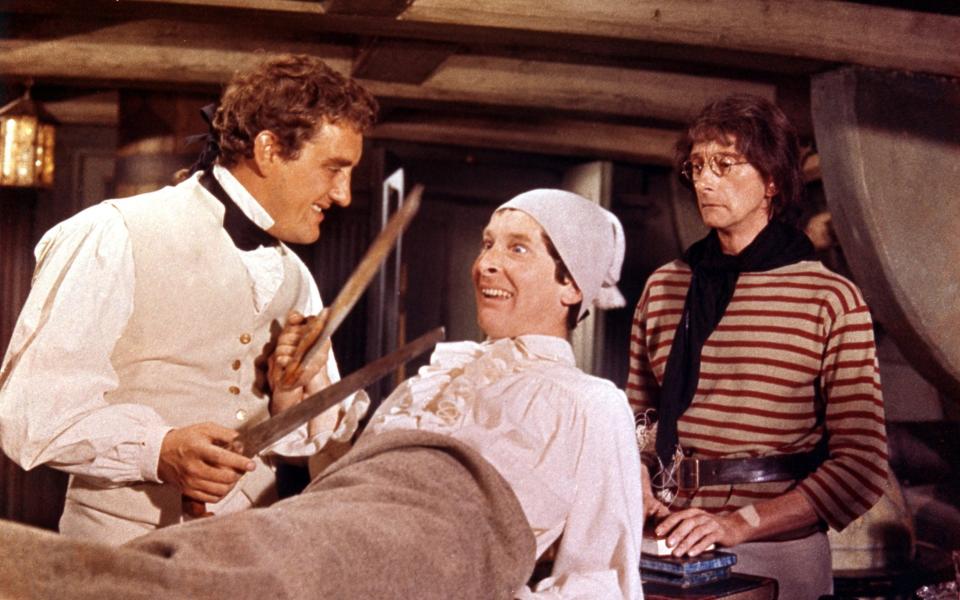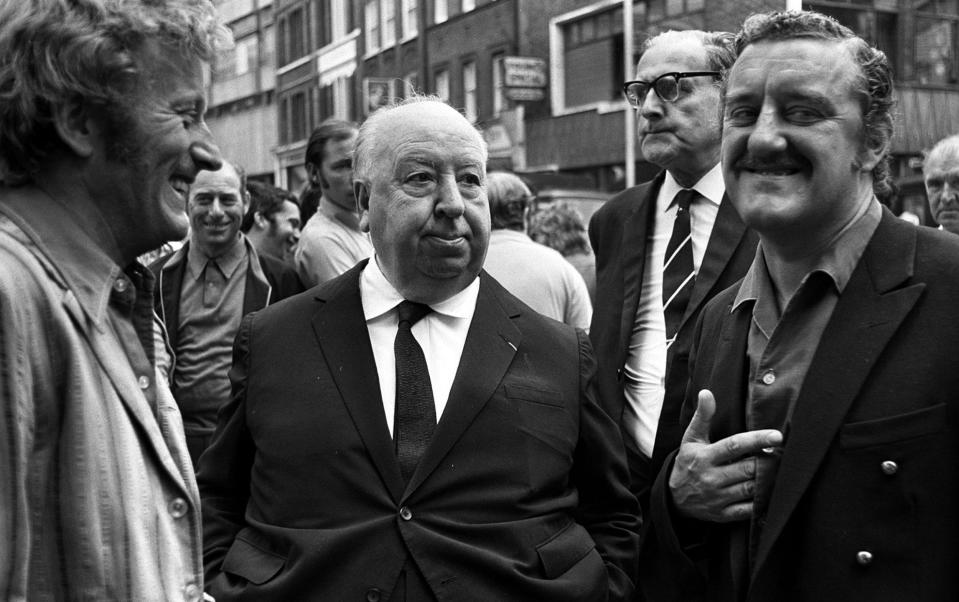Beyond The Railway Children: Bernard Cribbins’s weirdest and most wonderful roles

Amongst the many skills that the late, great actor Bernard Cribbins possessed was the ability to make the nation cry. Cribbins, who has died at the age of 93, was beloved by one generation for his appearance in The Railway Children as the superficially crotchety but deeply decent station master Albert Perks, and by another for his appearance in the David Tennant-era Dr Who as the former soldier Wilfred Mott, grandfather of the Doctor’s companion Donna Noble.
In both cases, his character was responsible for two tear-jerkingly emotional finales that never fail to make the most hardened Grinch murmur something about “a piece of grit stuck in their eye”. In The Railway Children, Cribbins’s character is initially portrayed as a near-misanthrope who never celebrates his birthday because he doesn’t see the point of so doing. The eponymous children secretly organise a party for him and manage to penetrate his gruff exterior in the process.
This duly cues the ending, when Jenny Agutter’s character Bobby meets a happily grinning Perks at the station. He merrily kisses and embraces her and declares: “I was never so pleased with anything in all my born days.” The cause of Perks’s joy is, of course, the return home of the children’s wrongfully accused father, and the look of quiet happiness that Cribbins delivers as Bobby and “my daddy” are reunited is, in its own way, as affecting as the grander emotional demonstration that duly follows. He was nominated for a Bafta; he should have won it.
Nearly half a century later, Cribbins, by then firmly ensconced as a national treasure, was central to the send-off of David Tennant’s Tenth Doctor. In a series of affecting scenes, Cribbins’s character Wilf accidentally brings about the end of his surrogate son, despite offering to sacrifice himself in the process, declaring: “I’ve had my time.”
Yet the Doctor willingly absorbs a fatal dose of radiation to save Wilf and thereby brings about his regeneration into Matt Smith’s Eleventh Doctor. The final scene that Tennant’s Doctor and Wilf share at Donna’s wedding is a particular testament to Cribbins’s powers of understatement as an actor, as Wilf tearfully bids farewell to the Doctor. Inevitably, the scene of an emotional Cribbins waving a valedictory salute has become a social media meme, and never more so than with the news of his death.

Yet Cribbins’s remarkably long and eclectic career encompassed more than simple emotional catharsis. From his TV debut in David Copperfield in 1956 to what will be his parting appearance in Doctor Who next year, reprising his Wilf role for the last time, he managed to occupy a unique place in entertainment.
There were few other actors who worked with Alfred Hitchcock, Peter Sellers and Danny Dyer, and remained unscathed by the experience, just as it is hard to think of many other people who could have a series of novelty hits in the Sixties – including the song Right Said Fred, produced by George Martin and a top 10 single in 1962, and one of Noel Coward’s Desert Island Disc choices, Hole In The Ground – and make their Shakespearean debut on screen at the age of 87, in the role of Tom Snout in the Russell T Davies-adapted A Midsummer Night’s Dream. Mourning Cribbins’s death, Davies recalled that when he asked the actor: “Do you fancy doing some Shakespeare, Bernard?” that his response was that typical riposte of any seasoned thespian: “Let me see the script.”
Like many comic actors who emerged in the Sixties, Cribbins was associated with the Carry On series, although never as intimately as the Williams-James-Windsor-Hawtrey stalwarts. He appeared in three of the films over the years, including the disastrous 1992 flop Carry On Columbus – as well as one of the series’ best, the 1964 espionage spoof Carry On Spying – and, perhaps because of his relative detachment from the franchise, was able to discuss them with a refreshing degree of candour, bemoaning both the pitiful rates of pay and the rushed production schedules.
In a 2018 interview, he described Sid James as “a lovely man”, but decried “Kenny” Williams as “the biggest show off ever” and “somewhat acidic”; he relayed a story of how, on the final time that he and the actor were together at Pinewood Studios, Williams passed Cribbins and snapped “Oh God, you don’t change do you”, which Cribbins described, with good humour, as “a very cryptic thing to say”.
Williams’s dig, while reductive and unfair, epitomised a perception of Cribbins, both on and off screen, as a decent, occasionally – and understandably – exasperated but fundamentally kind-hearted soul, always ready with a consoling pat on the back and a jolly, if occasionally inappropriate, quip. This was not wholly accurate as regards his work on screen.
It was typical of his versatility that, two years after playing the kindly Perks, he appeared in Alfred Hitchcock’s penultimate film Frenzy – the great director’s return to British cinema after an absence of over three decades in Hollywood – as one of the most slimily unpleasant characters to be found anywhere in Hitchcock’s oeuvre. As the lecherous, bullying publican Felix Forsythe, Cribbins not only displays a fine line in sexist invective towards Anna Massey’s barmaid Babs Milligan, but casually betrays his so-called friend, Jon Foster’s quintessentially Hitchcockian innocent-man-accused Dick Blaney, to the police, purely on the grounds that Blaney’s presence in his pub is frustrating his brutish overtures towards Babs.
Indeed, when Cribbins allowed himself to shade into unpleasantness, he often gave some of his most interesting performances, whether it was his snooty and overbearing travelling salesman in the “Hotel Inspectors” episode of Fawlty Towers, an appearance as the enraged cuckold Pinchwife in the 1977 Play of the Month production of the Restoration comedy The Country Wife or his grimly lecherous would-be wealthy lothario Wally Bannister in Coronation Street, one of the Street’s near-endless parade of conmen and jumped-up spivs.

Nonetheless, Cribbins remained a much-beloved presence on television and film, not least because of his long association with Jackanory; he read a total of 114 stories on the children’s bedtime show between 1966 and 1991, far more than any other narrator. He later said that he caught a cab and that the driver told him: “Do you know, Mr Cribbins, that programme made me want to learn to read.” A moved Cribbins remarked: “I’ve never forgotten that.”
And towards the end of his life, he became a regular in the kind of cosily undemanding television shows that reinforce an image of an actor as being like a comforting, if slightly battered, jumper. His face could be seen in everything from Last of the Summer Wine to Midsomer Murders, and he had a leading role in the children’s show Old Jack’s Boat between 2013 and 2015 in which he played, unsurprisingly enough, Old Jack.
Yet his lengthy career also encompassed some more surprising detours. In his Sixties heyday, he acted opposite Sellers – and very much held his own – in two of the comedian’s most successful early films, Two Way Stretch and The Wrong Arm of the Law, as well as having a cameo in the disastrous all-star spoof Casino Royale. Later in life, Cribbins reflected: “He was a lovely man, he hadn’t gone global and had Hollywood turn his head, he was one of the chaps and you only had to do a Goon voice and you got him going!”
Cribbins was never seriously in danger of becoming a Hollywood superstar himself, although he did have a leading role in the 1965 Hammer H Rider Haggard adaptation She – opposite Ursula Andress as the eponymous immortal queen Ayesha – and he made an unexpected appearance as Gertrude Stein in the 1978 surrealist Swedish comedy The Adventures of Picasso, hinting at an avant-garde bent that went largely underexplored in the rest of his work.
Because of his 70-year career in an often fickle industry, Cribbins remained much in demand for newspaper interviews and television appearances until the end of his life, all of which he embraced with the same half-amused, half-wry stoicism. If an interviewer ever tried to delve beneath the surface, they were batted away with another – usually excellent – anecdote, or an amused reflection. When the Guardian’s Simon Hattenstone asked him in 2014 whether he was an emotional man, he dealt with it briskly (“I can have a gulp”) but demonstrated a clear appreciation of his own abilities. “I think I'm a good actor, without being boastful. I have an array of voices.”
Yet perhaps the truer insight was when Hattenstone asked him to describe himself in five words, and Cribbins responded that he was “impatient, caring, perfectionist, sentimental, loyal”. All of these are characteristics that could be found in his screen work throughout his career. Not for the first time, he was being too modest.

 Yahoo News
Yahoo News 